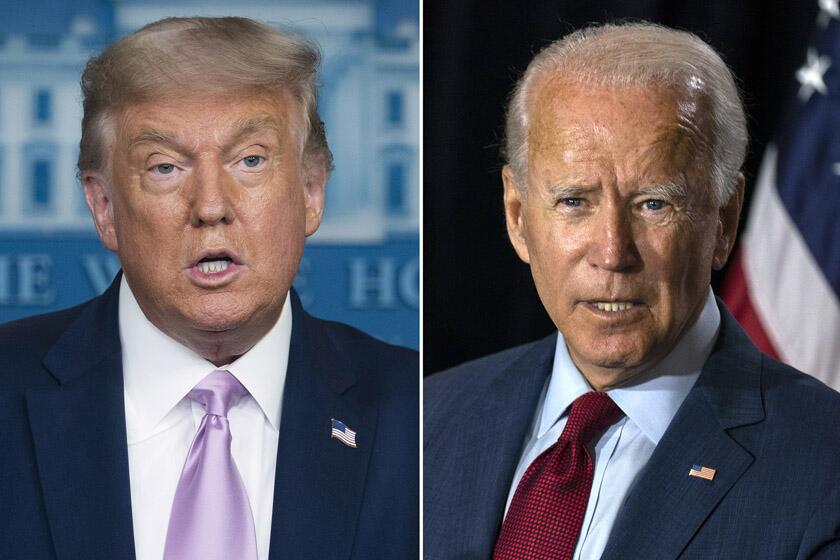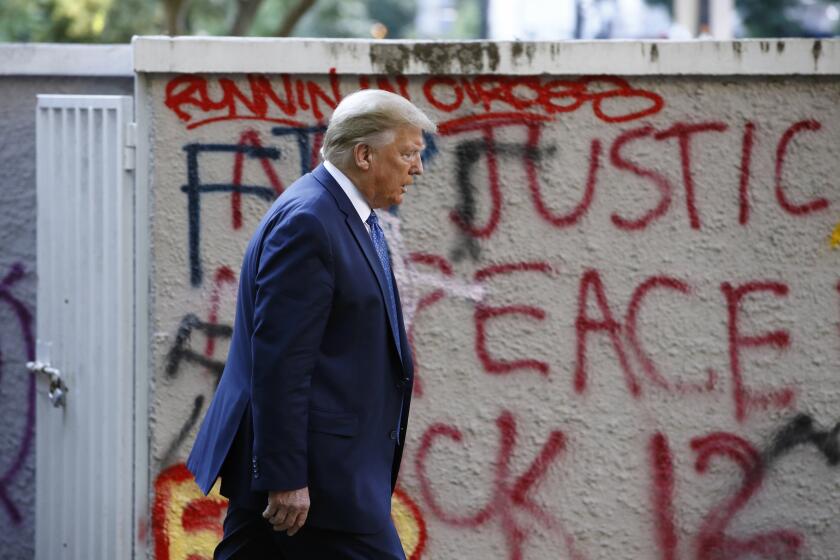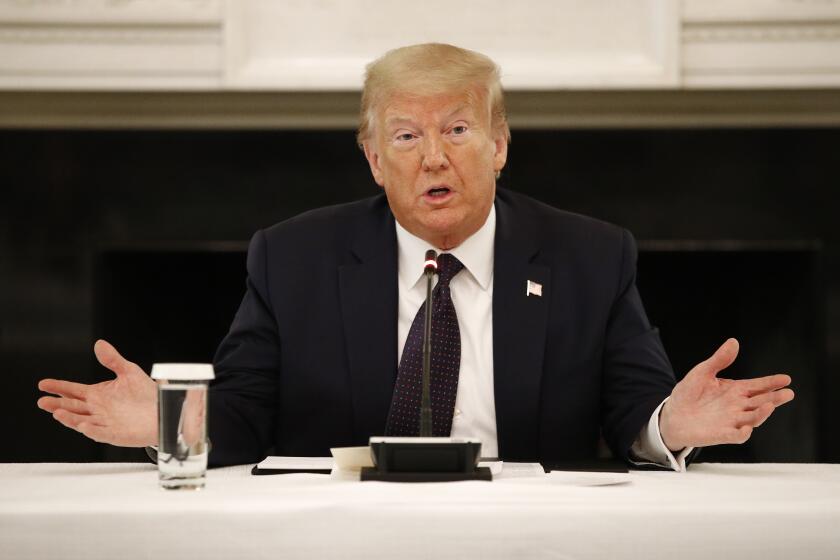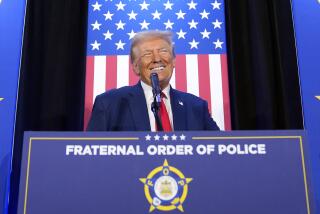President Trump and Joe Biden offer opposing visions of policing
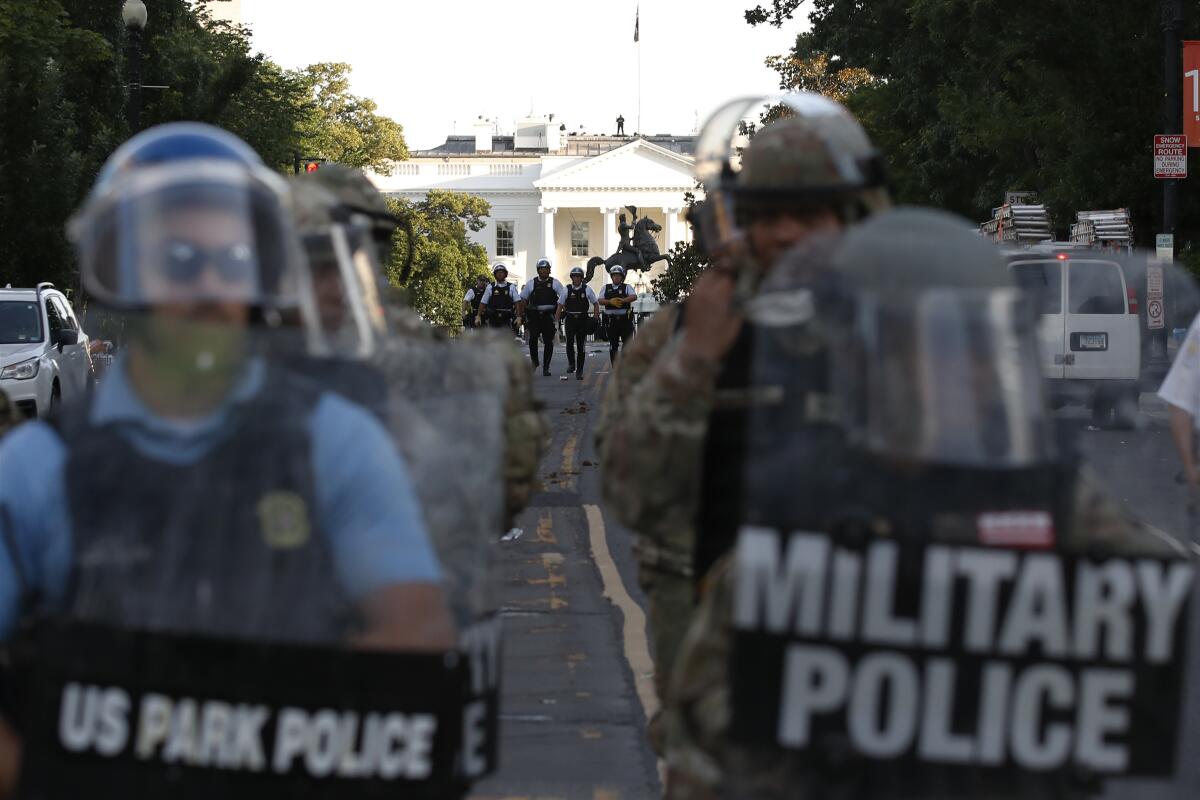
- Share via
Policing policy has swept into the heart of the 2020 presidential election as controversial police killings of Black Americans have also triggered sometimes violent clashes between officers and protesters in multiple U.S. cities.
President Trump has taken a hard-line position on policing, symbolized most dramatically by his administration using federal law enforcement and security forces to violently clear out peaceful protesters outside the White House so he could pose holding a Bible outside a nearby church.
Democratic nominee Joe Biden has backtracked from his tough-on-crime positions during his decades in the U.S. Senate by urging liberal reforms to policing to limit the use of force, while rejecting the growing left-wing calls to “defund” or dismantle local police departments. He has also repeatedly denounced the violence that has emerged around some anti-police protests.
It’s not clear whether or how much most Americans’ day-to-day relationships with police would change under a Trump or a Biden administration. Police departments are locally run and primarily regulated by local and state laws, with collective bargaining agreements and police unions often serving as brakes against change, though the federal government does have some power — by providing funding or by forcing oversight via consent decrees — to encourage change in individual departments.
The two candidates do offer distinct and different federal policy proposals on local policing, and above all, they vastly differ on how they talk about policing’s role in American life.
A look at where President Trump and Joe Biden stand on key issues in the 2020 election, including healthcare, immigration, police reform and climate.
President Trump
The president has sometimes talked about policing as an authoritarian leader might, emphasizing domination and force over civil liberties and due process. At a 2017 event in Long Island, N.Y., he suggested officers not worry so much about injuring suspects. In a speech mentioning immigration agents and gangs, he spoke of suspects in “a paddy wagon ... thrown in, rough.” He added, “I said, ‘Please don’t be too nice.’
“Like when you guys put somebody in the car and you’re protecting their head, you know, the way you put the hand over? .... You can take the hand away, OK?”
As protests and violence flared in Minneapolis this spring and summer after the death of George Floyd, a Black man, while in police custody, Trump threatened to send in the military, tweeting, “When the looting starts, the shooting starts.” After federal forces on June 1 cleared away protesters in Lafayette Square outside the White House using force and chemical irritants, Trump tweeted, “Our great National Guard Troops who took care of the area around the White House could hardly believe how easy it was,” adding, “GREAT JOB!” He has also celebrated police violence against journalists, recently describing police manhandling one reporter while covering a protest as “a beautiful sight.”
In one call with the nation’s governors, Trump laid out his philosophy on police violence as a necessary ingredient of enforcing control, reportedly telling them, “If you don’t dominate, you’re wasting your time. ... The harder you are, the tougher you are, the less likely it is that you’re going to be hit.” In the same call he praised the forceful police crackdown that ended the largely peaceful Occupy Wall Street movement in 2011: “It was a disaster until one day, somebody said, ‘That’s enough,’ and they just went in and wiped them out, and that’s the last time we ever heard the name Occupy Wall Street.”
Since taking office, President Trump has largely opposed or undermined the kind of police reforms that protesters around the country are demanding in the wake of George Floyd’s death in Minneapolis.
Several unions representing police officers have rewarded Trump with their endorsements, including the Fraternal Order of Police and the International Union of Police Assns., which is affiliated with the AFL-CIO. The IUPA cited Trump’s support for providing local police departments with surplus military equipment, tougher prosecutions of suspects accused of attacking police and the Trump administration’s support for resuming federal executions.
Early on, the Trump administration, under then-Atty. Gen. Jeff Sessions, curtailed the pursuit of consent decrees from federal judges that forced oversight of troubled local police departments. The Obama administration often used the decrees to force reforms in cities whose police had demonstrated a pattern and practice of using racial discrimination or other illegal policing methods. The Trump administration found the tool too intrusive.
The Trump administration has grown more assertive in trying to override liberal local officials who make policies the president doesn’t like. In September, citing protests in Seattle, New York and Portland, Ore., Trump’s Justice Department deemed the cities “anarchist jurisdictions” for not cracking down on protesters more aggressively and has threatened to withhold federal funding.
But for Trump’s positions on policing, his administration was also supportive of the First Step Act passed into law in 2018, giving a chance for nonviolent offenders to be released from prison earlier and for future sentences to be lighter.
How to reshape the nation’s police forces has become a major campaign issue. President Trump hopes to portray Joe Biden as extreme.
Joe Biden
Biden’s trajectory on criminal justice is in many ways the story of the issue’s evolution inside the Democratic Party over the last few decades.
In 1994, as many of the nation’s cities were being ravaged by homicides, Biden was a key force in enacting the most sweeping anti-crime law in the nation’s history. That gave the Democratic Party credibility to call itself “tough on crime” after Republicans since President Nixon had cast their party as leaders on “law and order” in a nation chronically rippling with racial tensions. The law included mandatory-minimum sentences for “three strike” offenders, a measure that helped balloon the nation’s prison population with Black and brown inmates.
Today, violent crime rates have dramatically fallen, and activists, including those in the Black Lives Matter movement, have spent the last decade moving the Democratic Party more to the left on criminal justice, leaving career Democrats such as Biden — and his running mate, California Sen. Kamala Harris, a former prosecutor — on the defensive to explain their records. Those tensions have only grown this year as some activists have gone far past recommending reforms, seeing policing as unreformable. Far-left demands now often call for officials to break police unions and to, by various degrees, dismantle, downsize or abolish police departments.
Biden has refused to embrace calls to “defund the police.” He has called “the vast majority” of officers “decent, honorable people,” while urging problem officers to be prosecuted. Commenting recently on a police officer shooting a Black man, Jacob Blake, in the back seven times in Kenosha, Wis., Biden said he supported Blake’s family, adding, “Justice must and will be done.”
In his 2020 platform, Biden supports boosting funding for “community-oriented policing” and hiring police forces that reflect the racial makeup of the communities they serve. He also proposes pairing police with social workers and experts on mental health, substance abuse and disability to respond to calls for service.
Biden’s platform would reverse the Trump administration’s position on consent decrees and expand the Justice Department’s oversight powers of troubled local departments to include “systemic misconduct by prosecutors’ offices.”
“Black mothers and fathers should feel confident that their children are safe walking the streets of America,” Biden’s website says of its criminal justice platform, which also gives a nod to police safety. “And, when a police officer pins on that shield and walks out the door, the officer’s family should know they’ll come home at the end of the day.”
Biden has called to reduce prison populations, including by eliminating mandatory minimums, decriminalizing marijuana use and diverting drug users away from prisons and toward treatment programs.
More to Read
Get the L.A. Times Politics newsletter
Deeply reported insights into legislation, politics and policy from Sacramento, Washington and beyond. In your inbox twice per week.
You may occasionally receive promotional content from the Los Angeles Times.
